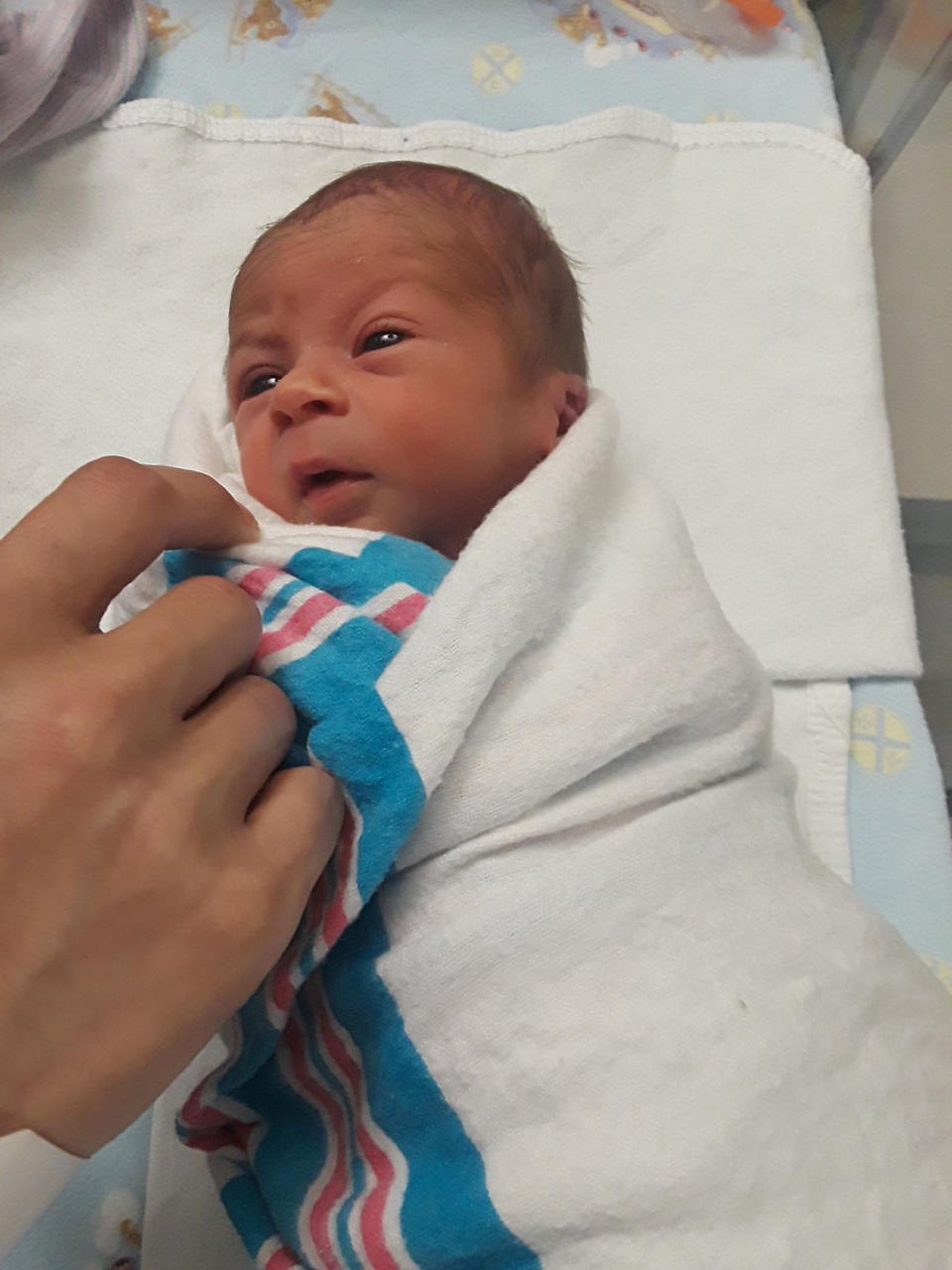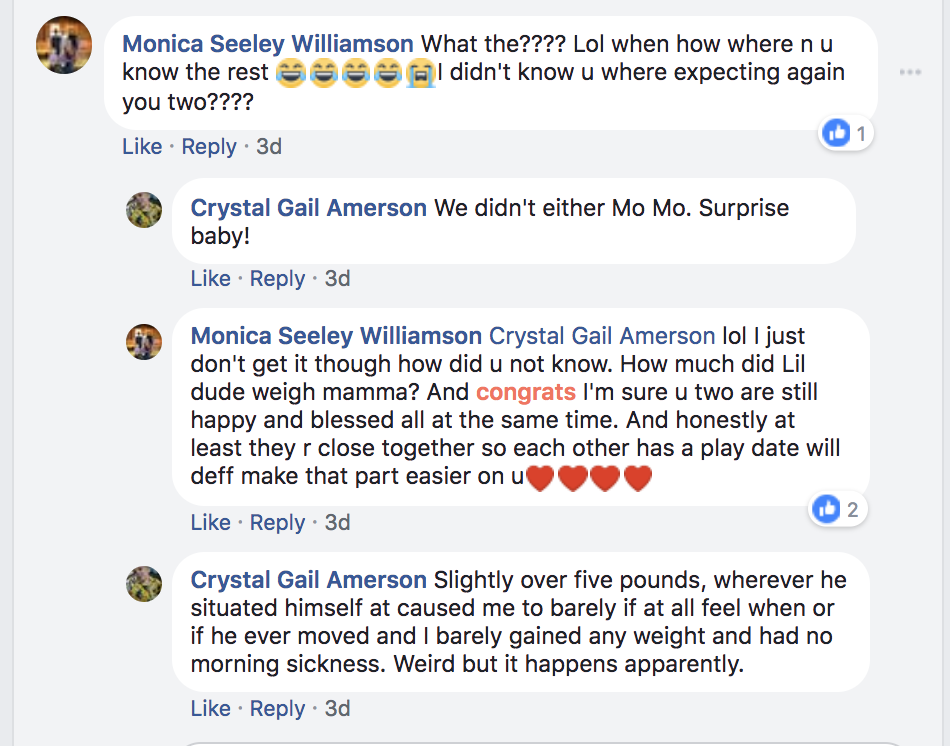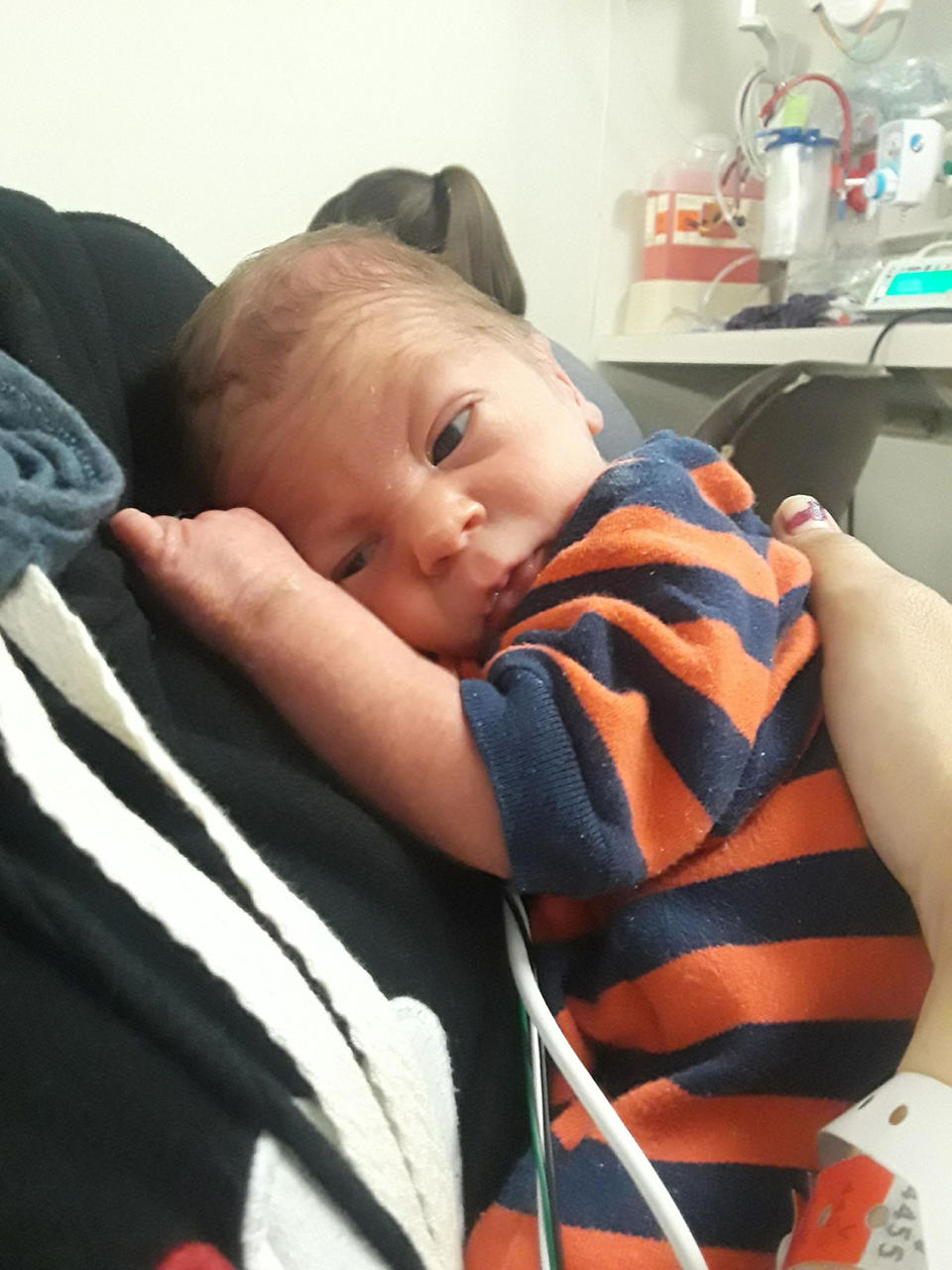Florida woman thought her 37-week pregnancy was bad Chinese food: 'I was in shock'
At 4 a.m. on March 25, 29-year-old Crystal Gail Amerson awoke with a searing pain in her abdomen. With her fiancé, Brian Westerfield, sleeping beside her, she thought about the Chinese food they’d eaten the night before. Perhaps she was having a reaction to the General Tso’s chicken?
But as minutes turned to hours and the pain got worse, it finally hit her: This wasn’t food poisoning, these were labor contractions. It’s a startling revelation for anyone, but especially a woman who has been unaware — until this moment — that she’s pregnant. “I was in shock,” Amerson tells Yahoo Lifestyle of the moment she realized she was in the midst of giving birth. “And so much pain!”

After directing her fiancé to call an ambulance, Amerson tried to breathe through the pain. Shortly after they arrived at the hospital, she gave birth to a 5-pound, 18-inch baby boy, naming him Oliver James in honor of her stepfather, who had recently passed away. At the hospital, doctors informed Amerson that she had been 37 weeks pregnant — meaning that, without realizing it, she’d carried a baby to full term.
“When the shock initially wore off, I was just relieved that everyone was okay,” Amerson wrote on Facebook while en route to the hospital to check on Oliver, who will remain there for a few days. “It was a rough time, but it ended better than it could have.” Amerson, who works at a retirement home, has one young son with her fiancé but was holding off on having another child due to financial constraints. With the unexpected costs, her fiancé launched a GoFundMe to help them pay off their medical bills.
The story — although admittedly bizarre — isn’t exactly an anomaly. Often referred to as a “cryptic pregnancy,” a pregnancy that goes unnoticed is something that has long captivated the public, leading to TV shows, personal essays, and Facebook support groups. Researchers in Serbia studied the phenomenon in 2010 and estimated that as many as one in 475 pregnancies goes unnoticed for the first 20 weeks. But overlooking a few months of missed periods is one thing; making it 37 weeks is another. That’s a less common situation, one that the researchers found in just 1 out of every 7,225 births.
Their study classified two types of “unknown” pregnancy, one in which the woman is simply denying it, and the other in which a woman is truly not aware that she is pregnant. In Amerson’s case, all signs point to the latter — that she genuinely had no clue that she was carrying a child. On the post she added to Amerson’s Facebook about baby Oliver, a friend expressed utter shock that Amerson had had a baby.
“What the???? … I didn’t know you were expecting again!” she wrote. “We didn’t either,” Amerson replied.

As with her first son, Wyatt, Amerson says she didn’t gain much weight and didn’t experience the morning sickness that many women do. She also didn’t feel kicking. “I felt what one may consider bubbles or gas at several points,” Amerson says. “But [doctors] said with how the placenta was situated toward the front of my stomach, it would have made it difficult to feel if he was moving about very much.”
Amerson had also been on birth control in the past that had eliminated her period, so although she didn’t get her period, that didn’t raise any red flags. Amerson wasn’t opposed to having more kids in the future, but she and Brian were planning to wait so that they could focus on Wyatt. “Another baby was definitely not in our immediate plans!” she tells Yahoo Lifestyle. “We were fully intending on just spoiling the one we had, rotten. But we weren’t against having another one either; we just weren’t prepared for one so soon and under these circumstances.”
When asked about the frequency of cryptic births, a San Francisco Bay Area ob-gyn, who asked not to be named, says that most of her colleagues have delivered a few. “Some women mistake spotting in pregnancy as their period and others kicking as gas,” the ob-gyn tells Yahoo Lifestyle. “How much you mistake one for the other depends on a lot of variables, including naiveté about reproductive health, education, and desire to not be pregnant.”
In a piece exploring cryptic pregnancies in the Huffington Post, science writer Jena Pincott also says it is a normal, albeit rare, occurrence. “Most unexpectedly expectant mothers are perfectly sane and educated,” Pincott writes. “Quite simply, they do not know they’re pregnant because they have no symptoms — no weight gain, no nausea, and little to no abdominal swelling. They may still have their periods, or have always had irregular periods. If they have symptoms, they’re so subtle as to be easily mistaken for something else.”
Pincott likens pregnancy to a tug-of-war between the mother and fetus for resources. “Most of the time it ends in a happy equilibrium — the fetus takes nutrients from the mother, but not enough to cause harm. The mother holds back, but not enough to harm the fetus,” Pincott writes. “Sometimes, though, under some conditions, mom gets a lot of rope — at the fetus’s expense.”
Although babies born from cryptic pregnancies can be at risk of certain things like low birth weight, in baby Oliver’s case, he seems to be doing just fine. And as for Amerson, she’s adjusting to life as a new mother of two. “I’ve accumulated two weeks of vacation time, so I’ll definitely be taking that time off,” Amerson tells Yahoo Lifestyle. “Then perhaps a few weeks after that as well, just to make sure that everyone is healthy — including myself — and happy before returning to work.”

Read more from Yahoo Lifestyle:
Alarming STD outbreak among suburb’s youth reflective of nationwide trend
A man in the U.K. got ‘super-gonorrhea’ — are you at risk too?
Follow us on Instagram, Facebook, and Twitter for nonstop inspiration delivered fresh to your feed, every day.

